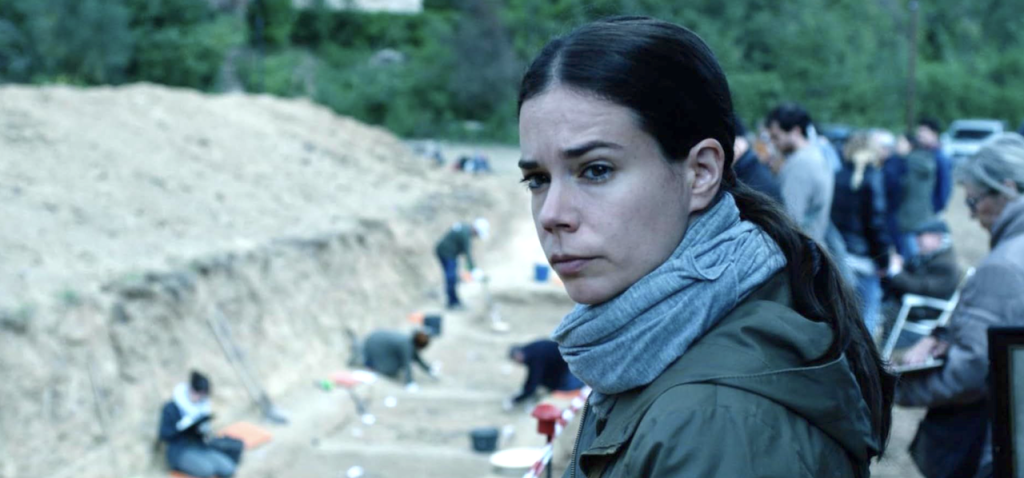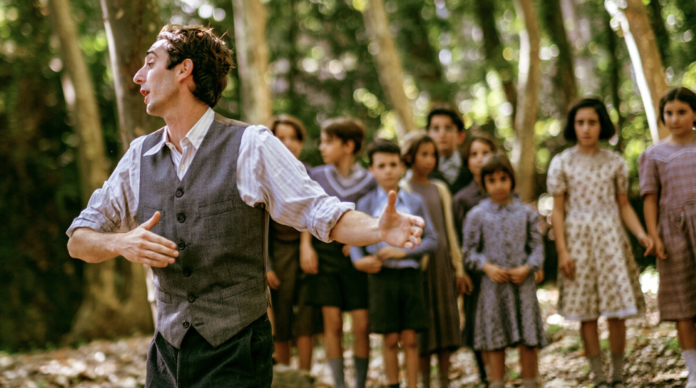Patricia Font’s latest film The Teacher Who Promised the Sea shines a poignant light on the haunting echoes of the Spanish Civil War.
The film opens with a sombre panning shot of an excavation site in the rural Spanish province of Burgos. In 2010, more than 100 bodies were discovered here. These remains belonged to supporters of the Republic who had been missing since the Civil War. Between 1936 and 1939, an estimated 114,000 people were murdered by Franco’s fascist army and buried in mass graves across Spain.
Font uses this discovery as the focal point of her film. At the dying request of her grandfather Carlos, the modern-day protagonist Ari (Laia Costa) begins a journey to uncover the final resting place of her great-grandfather, who has been missing since the Civil War. Costa is perfect for this emotionally challenging role, conveying Ari’s sense of despair with a subtleness that adds to the film’s overall tone of elegant restraint.
While Carlos’ body is not found in the Burgos grave as Ari had hoped, she becomes engrossed in the story of his teacher, Antoni Benaiges (Enric Auquer). Through a seamless flashback sequence, Font transports us to the conservative village of Bañuelos de Buereba.
Here, a young Antoni arrives as a fresh-faced teacher eager to transform the local escuela from a disciplined classroom into a haven that inspires the children’s curiosity and creativity. Maestro Antoni is the teacher of any child’s dreams. Using the pedagogy of French educator Célestin Freinet, Antoni encourages his students to develop their own interests. He swaps arduous vocabulary lists and times tables with forest adventures and art projects. On a mission to broaden the children’s insular horizons, he promises to take them on a life changing journey to see the ocean for the first time.

While Antoni’s idealism may seem excessively naïve in the context of Franco’s dictatorship, the sparkling vivacity that oozes from Auquer’s performance gives his character a hypnotising charm. We can’t help but sympathise with Antoni’s maxim: “Children must be children!”
Font imbues Antoni’s lessons with a sense of magic that makes the audience feel like we are part of his classroom. We experience the same intoxicating wonder as his students.
This is most prominently felt when Antoni unveils a printing press. Here, Font uses a sudden shift in lighting to emphasise just how important the printing press will be in fostering a lifelong love of learning within the children. Their sense of awe is heightened by Natasha Arizu’s original score, featuring a glittering harp melody that develops as a motif throughout the film.
But Antoni’s unorthodox teaching methods tread a fine line under the oppressive, ultra-conservative ideas of Franco’s fascist regime. His atheism, which he makes apparent through his refusal to hang a crucifix in the classroom, combined with his outward left-wing sympathies, place him in a vulnerable position when the fascists begin their rule in the village.
The film’s previous playfulness is disrupted by violence. The children’s colourful school books are burned in a public bonfire. So-called ‘dissidents’ are pulled from their homes and flogged.
While these scenes are confronting, Font manages to avoid the melodramatic, sensationalised pull of violence that wartime films often fall victim to. Instead, she opts for a more distant tone. In one of the film’s final shots, the audience is left with a sprawling landscape that captures the rolling hills of Northern Spain. This scene is accompanied only by the sounds of the natural world. It is sparse but provides us with a necessary space to reflect on the brutalities we have just witnessed.
Font does not leave us in complete despair. With a final return to present-day Spain, we see a frail Carlos sitting quietly by the ocean with his granddaughter Ari. While Carlos’ much-loved maestro was not able to keep his promise, it is heartwarming to see that Antoni’s legacy has had a lasting impact.
The Teacher Who Promised the Sea is a breathtaking excavation of Spain’s dark history. In her skilful interweaving of past and present, Font showcases how the trauma that the Civil War left behind belongs not only to the realm of history books but continues to shape lives today.
The Teacher Who Promised the Sea is showing now at Palace Cinemas.


